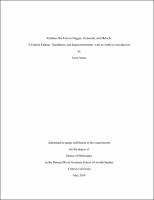Please use this identifier to cite or link to this item:
https://hdl.handle.net/20.500.12202/5278Full metadata record
| DC Field | Value | Language |
|---|---|---|
| dc.contributor.advisor | Cohen, Mordechai Z. | |
| dc.contributor.author | Frazer, Ezra | |
| dc.date.accessioned | 2020-03-30T22:35:19Z | |
| dc.date.available | 2020-03-30T22:35:19Z | |
| dc.date.issued | 2017 | |
| dc.identifier.citation | Frazer, E.H. (2018, May). Abraham Ibn Ezra to Haggai, Zechariah, and Malachi: A critical edition, translation, and supercommentary with an analytic introduction (ProQuest No. 2157954936) [Doctoral dissertation, Yeshiva University]. PDTG Source: Dissertations Abstracts International, Volume: 80-06, Section: A.;Publisher info.: Dissertation/Thesis.;Advisors: Cohen, Mordechai Z. | en_US |
| dc.identifier.isbn | 978-0-438-07140-7 | |
| dc.identifier.uri | https://hdl.handle.net/20.500.12202/5278 | |
| dc.identifier.uri | https://ezproxy.yu.edu/login?url=http://gateway.proquest.com/openurl?url_ver=Z39.88-2004&rft_val_fmt=info:ofi/fmt:kev:mtx:dissertation&res_dat=xri:pqm&rft_dat=xri:pqdiss:10868340 | en_US |
| dc.description.abstract | Rabbi Abraham Ibn Ezra is the most prominent biblical exegete of the medieval Spanish school of peshat exegesis, which pursued the plain sense of Scripture on the basis of philology and reason. A true polymath, Ibn Ezra's writings demonstrate a mastery of Hebrew grammar, philosophy, astronomy, and astrology, as they were known in the Middle Ages. Ibn Ezra's travels through Christian Europe made him an important conduit for the transmission of knowledge from Islamic lands to Christian lands. This dissertation focuses on his commentaries to the final books of Minor Prophets: Haggai, Zechariah, and Malachi. An analytic introduction examines Ibn Ezra's relationship with the sources that influenced his commentaries to these books, as well as the influence of his commentaries on subsequent exegetes. It also examines several methodological aspects of Ibn Ezra's exegesis that are especially relevant to these books, such as the relationship between his two commentaries to Minor Prophets (the so-called "standard commentary" and "oral commentary") and his methods for calculating the chronology of the Persian Period. Lastly, it examines broader exegetical issues that arise in these books but are relevant to much of his biblical exegesis, including his methodology for interpreting prophecy and the significance that he attributes to certain nuances and irregularities of the biblical text. The analytic introduction is followed by my own English translation of Ibn Ezra's commentaries to Haggai, Zechariah, and Malachi, accompanied by a supercommentary to explain and analyze Ibn Ezra's comments. After my English translation and supercommentary, I present a Hebrew critical edition of these commentaries. The conclusions of this dissertation seek to situate Ibn Ezra's commentary within the tradition of Jewish Bible interpretation. | en_US |
| dc.language.iso | he | en_US |
| dc.publisher | ProQuest Dissertations & Theses Global | en_US |
| dc.subject | Religious history | en_US |
| dc.subject | Biblical studies | en_US |
| dc.subject | Judaic studies | en_US |
| dc.title | Abraham Ibn Ezra to Haggai, Zechariah, and Malachi: A critical edition, translation, and supercommentary with an analytic introduction | en_US |
| dc.type | Dissertation | en_US |
| dc.type | en_US | |
| Appears in Collections: | Bernard Revel Graduate School of Jewish Studies: Doctoral Dissertations | |
Files in This Item:
| File | Description | Size | Format | |
|---|---|---|---|---|
| Frazer Ezra 2018 OA Abraham ibn Ezra.pdf | 6.09 MB | Adobe PDF |  View/Open |
Items in DSpace are protected by copyright, with all rights reserved, unless otherwise indicated.
